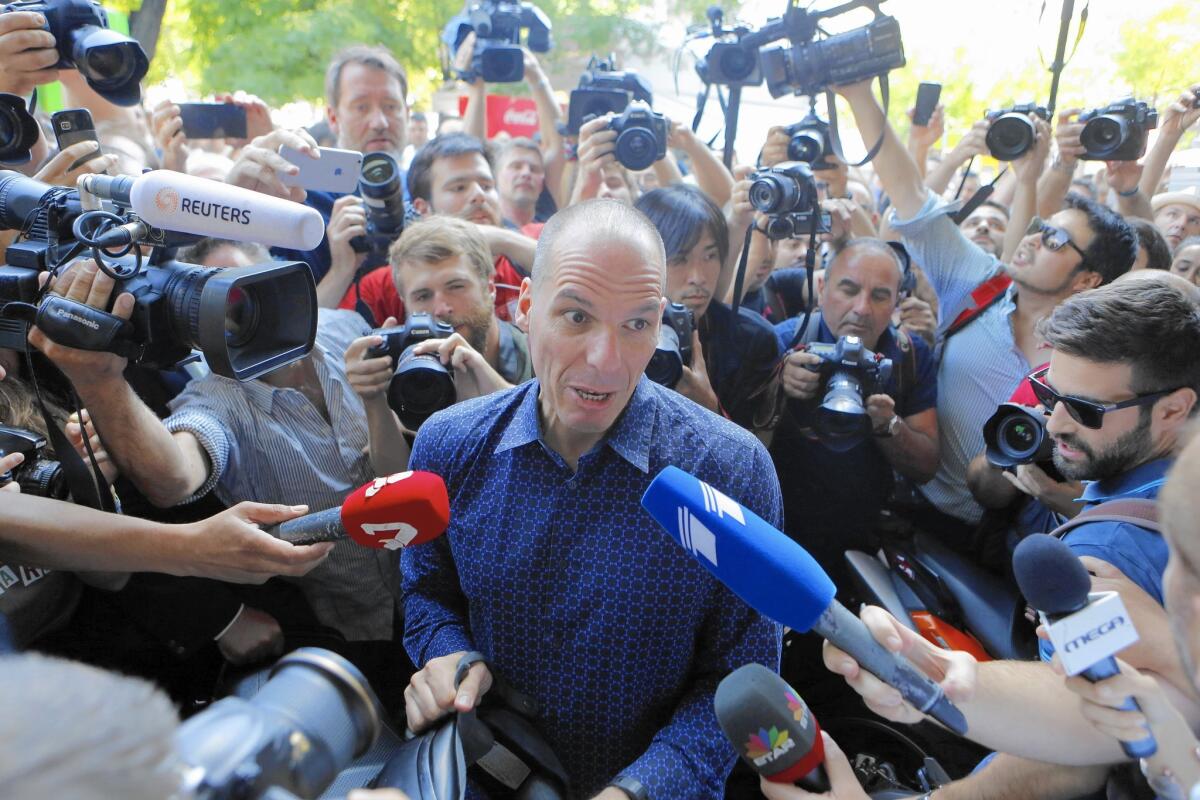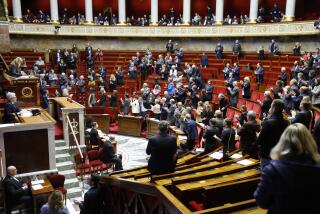Greeks philosophical about uncertain future after rejecting bailout deal

In the end, Greek voters preferred ambiguity about their future to the certainty of more economic hardships.
“We don’t know what’s going to happen now: Maybe it will be worse for a while, but maybe it will get better eventually,” said Alexandra Tsalafouta, who, along with her husband and infant son, was among the multitudes strolling Monday along the picturesque harbor-front promenade of this northern port city. “But if we had voted ‘yes,’ for sure things would have been worse.”
It was a sentiment often heard a day after Greeks overwhelmingly rejected an international bailout plan that would have imposed drastic new austerity measures on a nation where residents are plainly fed up with what many view as cutbacks imposed by a shadowy economic elite. More than 60% voted “no” to the rescue package, a landslide by any measure.
“I don’t know who’s behind it all: the Germans, the Russians, the Americans — who knows?” asked one pensioner seated with other elderly Greeks on a bench in Aristotle Square, where a bronze bust of the philosopher ponders the tranquil scene. “Someone is doing this to us.”
Still, she said she was in the minority that voted “yes” in Sunday’s referendum.
“For stability,” explained the woman, who gave only her first name, Eugenia, for privacy reasons.
“We are worried; Greece needs stability,” she said, as her bench mates nodded in agreement. “The banks? What is going to happen to them?”
It was a theme — vote “yes” for stability — that was often heard from “yes” proponents, especially in the media. But the campaign may have backfired: Many seemed to view the intensive pro-”yes” effort as a scare tactic meant to convince Greeks that voting “no” could have catastrophic consequences, especially for pensioners.
Closed banks and long lines at ATMs in recent days fanned the fears. Yet Greeks ultimately didn’t buy the doomsday scenario.
“A lot of people felt it was all propaganda,” said George Giorgos, 19, an Internet cafe employee studying computer science in Thessaloniki, Greece’s second-largest city and home to a large student population. “It had the opposite effect, making a lot of people vote ‘no.’”
He, like others, stressed that Greeks were determined to remain part of the European Union, a bond that many view as historic, cultural and unbreakable. Many seemed confident that a deal more favorable to Greeks will emerge from talks between European leaders, keeping Greece from defaulting on its debt and exiting the Eurozone.
“Of course we will stay with Europe,” said Michael Michalis, 18, a physics student.
People in the city talked about a collective fatigue with years of dwindling incomes, vanishing job opportunities and a loss of a sense of security. Many who cast “no” votes Sunday did so as a collective rebuff of forced pauperization, a national declaration that enough is enough. They lamented the pejorative image of Greeks as people who don’t want to work.
“We all work hard and want something better for our children,” said Tsalafouta, glancing at her 18-month-old son, Gabriel, in the arms of her husband, Evangelous Siomas, whose pest-control business has endured cutbacks. “Everyone is working longer hours and earning less.”
On a practical level, many business owners feared that new austerity measures and higher taxes would have been the death knell for already struggling enterprises.
“A ‘yes’ vote would have killed tourism here,” said a hotel owner on the island of Lesbos, a popular vacation spot for European visitors. “Tourism is the best thing Greece has going for it now. Why make it harder for us?”
Among “no” voters, there was a distinct sense that Greece had finally fought back against the banks and oligarchs — and especially against Germany, the economic colossus of the European Union.
“I’m not frightened of Germany’s junta,” said Anthi Papadopoulou, 73, a pensioner with four grandchildren who was among the jubilant “no” backers celebrating into the early hours of Monday in Athens’ Syntagma Square, in front of the Parliament building. “Right now we have a junta without tanks. It is economic war.”
Despite the prevalent uncertainty about what will happen next, she said she was not frightened, even if she were to lose her pension of nearly $555 per month.
“Many are not afraid — we will survive,” Papadopoulou proclaimed. “We’ll live on lentils if we need to.... They can take my pension.... My pride, they will never take.”
Others were more somber than exultant as European officials frantically tried to negotiate a solution to the crisis.
“Of course I’m still afraid and biting my nails expecting what’s going to happen over the next five days,” said Giorgos Kavasakalis, 38, an architect who voted “yes” in the referendum.
“Time is not on our side right now,” added Kavasakalis, who has been considering immigrating to the United States. “ We really have to hurry. Greece doesn’t have time. Something has to happen, and it has to happen real fast.”
Times staff writer Henry Chu and special correspondent Pavlos Zafiropoulos in Athens contributed to this report.
More to Read
Start your day right
Sign up for Essential California for news, features and recommendations from the L.A. Times and beyond in your inbox six days a week.
You may occasionally receive promotional content from the Los Angeles Times.





